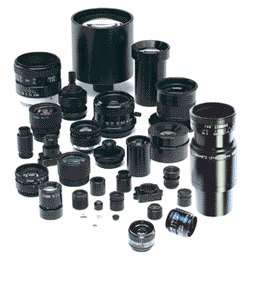High resolution lenses for machine vision — standard and custom lens design
Basic Infrared And Ultra Violet Lens Information
High Resolution Lenses for machine vision, instrumentation, inspection and vibration-sensitive applications. Standard and custom hi-res lens assemblies.

UV Lens
Camera lenses come in myriad forms and styles and two of them are infrared and ultra violet; each of which serves a different purpose. Infrared (IR) optics are filters that absorb heat; they are designed and manufactured to reflect or block infrared wavelengths. Visible light is allowed to pass through the lens. Devices that use incandescent light bulbs, overhead projectors, benefit from the use of infrared lenses. “Infra” is a Latin term that means, “below” and red is the color of the longest wavelength of visible light; IR has light waves longer than typical red lights.
Infrared is an electromagnetic radiation in which the wavelength is longer than the visible surrounding light, but shorter than the light of microwaves and terahertz radiation. The technology of infrared optics is used in many industries including:
- Robotics
- Military
- Microscopy
- Astronomy
When you consider that infrared light is crucial to the observation of active galaxies in the solar system in which the light needs to travel through gases and dust. Galaxies bathed in a high red means the spectrum of its light has shifted toward longer wavelengths and are easier to be viewed with infrared technologies.
UV lenses, on the other hand, are used to eliminate the blur caused by ultraviolet radiation in the environment; they also help improve the color reproduction. While infrared light is visible to the naked eye, ultraviolet lights are not. The ultraviolet light rays are typically prevalent in mountain regions, coastal areas or other areas of the country with clear air. The use of a UV filter on a camera provide protection rather than adding any additional exposure time to photography; the lenses attach to the camera as a filter that sits on the lens glass and helps to protect it from scratching, dust or other damage. When choosing a UV filter, you need to make certain it is as high a quality as the lens glass it will be covering so that it doesn’t impact the quality of the photograph.
The type of lens you need is predicated on the particular and specific use you have for it, but Universe Optics designs optical lenses for industrial, medical, high tech and electronic applications.